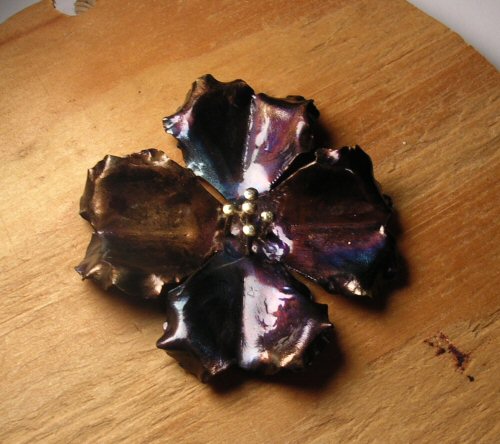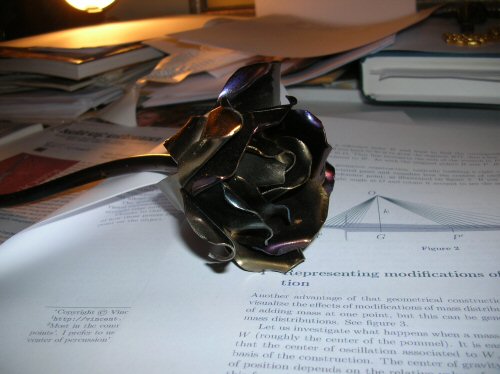| Author |
Message |
|
Sebastian Szukalski
|
 Posted: Fri 04 Oct, 2013 2:47 am Post subject: Regarding Heat Tinting Posted: Fri 04 Oct, 2013 2:47 am Post subject: Regarding Heat Tinting |
 |
|
I've read several documents regarding the temperatures at which steel will oxidise into its various colours, but none from the perspective of someone heat treating fittings. How would one go about heating them? Some articles have suggested using a MAPP/propane torch, others recommend an oven.
Personally I am seeking a even yellow - gold tone, which would be achieved at around 345 degrees centigrade, yet I am unsure as to how to obtain a stable 345 degrees.
The fittings on my (yet to arrive) sword will be stainless steel, if that is at all relevant.
Any information or tips (anecdotal or otherwise) will be much appreciated.
|
|
  |
 |
|
Peter Johnsson
Industry Professional
|
 Posted: Fri 04 Oct, 2013 4:41 am Post subject: Posted: Fri 04 Oct, 2013 4:41 am Post subject: |
 |
|
It is worth noting that the colors you get from tempering are not very permanent.
They are formed by a thin oxide layer that is easily worn of.
The yellow/gold tone you see on heated steel is not very luminous or strong. It is no where like gilding, but more like a metallic watercolor wash.
You get the temper colors by careful heating, either in an oven, or by using some other heat source, such as a propane flame. You have to work carefully and apply the heat evenly, r it is very easy to overshoot the temperature you are aiming for.
Go slow and be mindful that thicker parts take longer to heat up, while thinner parts are easily overheated. Apply the flame like if you are painting with a very sensitive sable brush. Slow deliberate strokes. Slightly slower over thicker parts and a bit quicker or more distant over thinner parts.
It takes a bit of practice to get a nice even color/temperature.
Stainless steel will also change change color, but the coors will again not be very resistant.
If you do this for aesthetic reasons you may want to think about some alternative methods. If you are looking for a gold colored hilt it is better to go for electrolytic gilding. Gilding is not permanent either, but will at least take a lot more wear and handling than tempering colors.
Good luck!
|
|
   |
 |
|
Sebastian Szukalski
|
 Posted: Fri 04 Oct, 2013 4:55 am Post subject: Posted: Fri 04 Oct, 2013 4:55 am Post subject: |
 |
|
|
I did look at electroplating, however that would require actual gold. Or perhaps brass. Regardless, it seems my only option for (semi) permanence.
|
|
  |
 |
|
Peter Johnsson
Industry Professional
|
 Posted: Fri 04 Oct, 2013 5:46 am Post subject: Posted: Fri 04 Oct, 2013 5:46 am Post subject: |
 |
|
Yes, gold is gold after all...
:-)
I would suggest you learn to love your sword without changing the color of its hilt. If it is a gilded character you are after, heat coloring will not look anything like it and it will also be short lived.
Try the method on a piece of stainless table cutlery and see for yourself if you think it is a good idea.
|
|
   |
 |
Leo Todeschini
Industry Professional

|
|
   |
 |
|
Sebastian Szukalski
|
 Posted: Fri 04 Oct, 2013 3:06 pm Post subject: Posted: Fri 04 Oct, 2013 3:06 pm Post subject: |
 |
|
|
Leo, you are my savior. This is perfect. I even found a video of someone doing this for our exact purposes. Apparently lasted two years, with sparring. Thank you, tod!
|
|
  |
 |
Daniel Wallace

Location: Pennsylvania USA Joined: 07 Aug 2011
Posts: 580
|
 Posted: Sat 05 Oct, 2013 7:27 am Post subject: Posted: Sat 05 Oct, 2013 7:27 am Post subject: |
 |
|
heat bluing? if your attempting to make a blue easy, other colors. difficult - especially if your using a torch. the temperatures at which the steel begins to change its colors from like straw yellow to pink, then to violets, are within like 50 degrees of each other. just the mass of the steel that will retain the heat will change its color once the heat source is taken away. personally I've locked in a pink tone for about 4 seconds - and with just the heat in the steel, it already changes to a violet. the key is to quench as quickly as possible to attempted to lock in the color.
it takes time practice patients, and a low burning torch. you can use oxy/acetylene but I'd recommend propane plumbing troch - at least with this you won't over heat too much. keep the torch good distance away, just like the flame touch the steel just like Peter said like a paint brush, and as light as '2 hairs and some air' if you get the internal cone of the flame in the steel, is going to work out pretty quickly but you may not control it as well.
i like this bluing for the ethicist of it, it offers no real protection like true chemical bluing or paint on bluing. and it scratches off with basically nothing. below I've got an example of whats on my work bench - a dogwood flower I'm working on for a carbuncle crucifix. this is mild steel - and it photographed with the rainbow-ed bluing really well, it was pink and straw color, one more stroke with a torch and i watched it marble into this.
 Attachment: 106.95 KB Attachment: 106.95 KB

dogwood
 Attachment: 93.69 KB Attachment: 93.69 KB

a rose made the same way, almost impossible to make it one uniform color other than blue.
|
|
  |
 |
|
|

